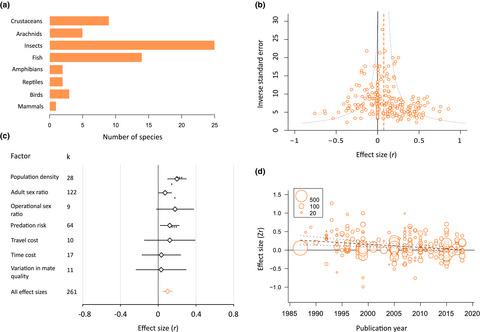当前位置:
X-MOL 学术
›
Ecol. Lett.
›
论文详情
Our official English website, www.x-mol.net, welcomes your feedback! (Note: you will need to create a separate account there.)
Meta‐analysis shows the evidence for context‐dependent mating behaviour is inconsistent or weak across animals
Ecology Letters ( IF 8.8 ) Pub Date : 2021-01-20 , DOI: 10.1111/ele.13679 Liam R. Dougherty 1
Ecology Letters ( IF 8.8 ) Pub Date : 2021-01-20 , DOI: 10.1111/ele.13679 Liam R. Dougherty 1
Affiliation

|
Animals often need to invest significantly in mating behaviour in order to successfully mate. However, the expression of mating behaviour can be costly, especially in unfavourable environments, so animals are expected to adjust their behaviour in a context‐dependent way to mitigate these costs. I systematically searched the literature for studies measuring animal mating behaviour (sexual signalling, response to sexual signals or the strength of mate choice) in more than one environment, and used a phylogenetically controlled meta‐analysis to identify environmental factors influencing these behaviours. Across 222 studies, the strength of mate choice was significantly context‐dependent, and most strongly influenced by population density, population sex ratio and predation risk. However, the average effect sizes were typically small. The amount of sexual signalling and the strength of response to sexual signals were not significantly related to the environment. Overall, this suggests that the evidence for context‐dependent mating behaviour across animals is surprisingly weak.
中文翻译:

荟萃分析显示,不同动物之间的背景相关交配行为不一致或脆弱的证据
动物通常需要在交配行为上投入大量资金才能成功交配。但是,交配行为的表达可能代价高昂,尤其是在不利的环境中,因此,动物应以与情境相关的方式调整其行为,以减轻这些损失。我系统地搜索了文献,以研究在多个环境中测量动物交配行为(性信号,对性信号的反应或选择配偶的强度)的研究,并使用系统发育控制的荟萃分析来确定影响这些行为的环境因素。在222项研究中,择偶的强度明显取决于具体情况,并且受人口密度,人口性别比和捕食风险的影响最大。但是,平均效果大小通常很小。性信号的数量和对性信号的反应强度与环境没有显着关系。总体而言,这表明在动物中依赖于情境的交配行为的证据令人惊讶地薄弱。
更新日期:2021-03-16
中文翻译:

荟萃分析显示,不同动物之间的背景相关交配行为不一致或脆弱的证据
动物通常需要在交配行为上投入大量资金才能成功交配。但是,交配行为的表达可能代价高昂,尤其是在不利的环境中,因此,动物应以与情境相关的方式调整其行为,以减轻这些损失。我系统地搜索了文献,以研究在多个环境中测量动物交配行为(性信号,对性信号的反应或选择配偶的强度)的研究,并使用系统发育控制的荟萃分析来确定影响这些行为的环境因素。在222项研究中,择偶的强度明显取决于具体情况,并且受人口密度,人口性别比和捕食风险的影响最大。但是,平均效果大小通常很小。性信号的数量和对性信号的反应强度与环境没有显着关系。总体而言,这表明在动物中依赖于情境的交配行为的证据令人惊讶地薄弱。


























 京公网安备 11010802027423号
京公网安备 11010802027423号